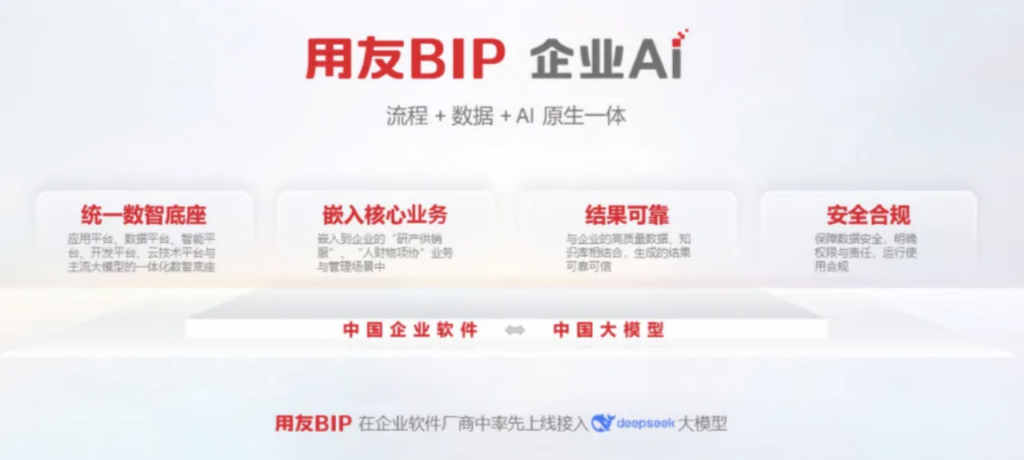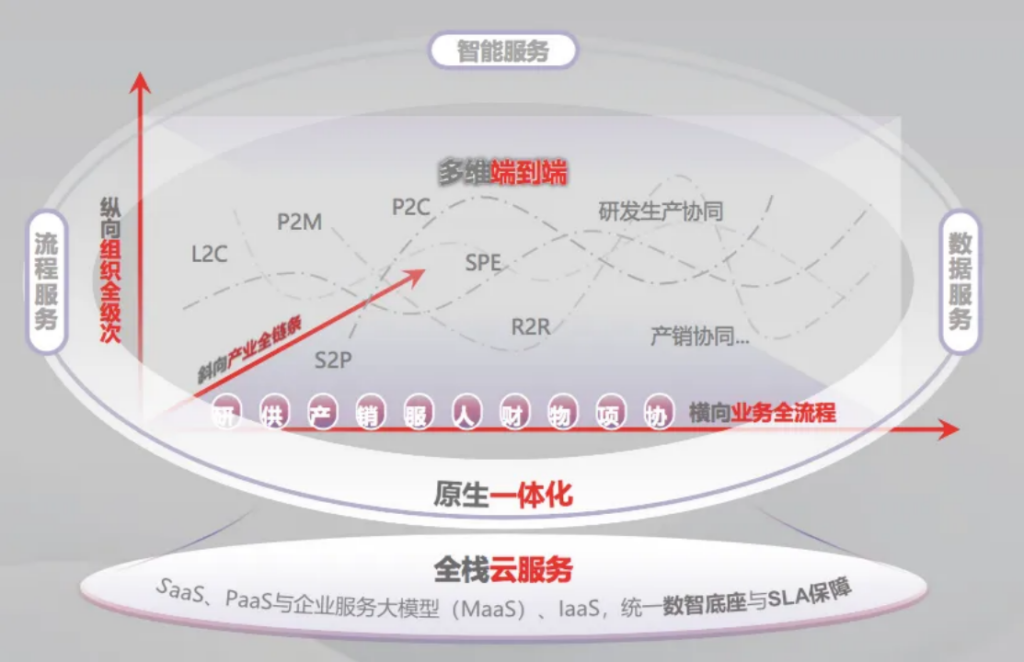
Imagine this: you’re excited to plug an AI “add-on” into your business system—expecting large models to analyze your reports and AI Agents to automate workflows—only to face constant system errors and unsupported data formats. At that moment, you realize the problem isn’t with the new technology, but with the outdated system it’s running on.
This is the current dilemma for many enterprises: they want to use AI, but can’t; or if they can, it often doesn’t work well. Just like early smartphones struggling to run modern apps, legacy platforms and next-gen AI are simply out of sync.
Not long ago, Yonyou partnered with Peking University to launch the “CIO/CDO Digital Intelligence Advancement Program.” Surprisingly, 60% of participants were company chairpersons themselves. Why? Because AI isn’t just a tech upgrade—it represents a fundamental reconstruction of enterprise logic.
Most traditional information systems were built around departments, resulting in fragmented data, rigid workflows, and missing master data—hardly a foundation for today’s complexity or intelligent decision-making. These limitations are now forcing business leaders to drive change proactively.
Thus, a new imperative has emerged: Digital-Intelligent Renewal—a call for enterprises to upgrade to modern platforms and architectures that connect data, unify systems, and embed AI into every business process.
Why Large Enterprises Need a “Native Unified” Approach
The reason is simple: AI demands it.
According to Chief Information Officer magazine, meaningful renewal is not about impulsively installing a new tool. It’s about testing an enterprise’s long-term system capabilities and reconstructing a digital backbone that fits the intelligent era—from architecture and data flow to business logic and user interaction.
At the beginning of this year, Yonyou launched BIP Enterprise AI, providing a practical framework for AI adoption. Facing the widespread issues of fragmented systems and data silos, Yonyou proposed a foundational principle:
To achieve real, sustainable AI outcomes, enterprises must grow from “native-unified” roots.

So, what is “native-unified”?
• Technically, it consists of three native layers: cloud-native, data-native, and AI-native.
• At the product level, applications and data platforms must be seamlessly integrated, enabling real-time coordination of all data—financial, production, and master—without extra governance layers.
• At the application level, AI is no longer an external tool, but inherently embedded in core processes—integrating data, workflows, and intelligence from the start.
Much like how the human nervous system, bloodstream, and skeleton function as one, Yonyou BIP breaks down data silos and application silos, removing fragmentation and enabling “invisible” upgrades toward enterprise intelligence.
Yonyou has built a three-tier native-unified architecture:
1. Platform foundation
2. Industry applications
3. Ecosystem services
This ensures total interoperability—between applications, between platforms and ISV partners, and across enterprise groups of all sizes. Yonyou also delivers full-stack cloud services from infrastructure to ecosystem, eliminating integration costs and complexity. While competitors struggle with fragmented systems, native-unified enterprises are already using AI to support strategic decisions and intelligent operations.
How AI Can Be Effectively Deployed
Once we understand the native-unified concept, the next big question arises:
How can enterprises move from theory to real, effective AI deployment?

Let’s look at how leading companies are doing it.
• A fast-moving consumer goods company faced production-sales coordination challenges. Too little production caused stockouts, while too much led to waste due to short shelf life. By connecting data across procurement, production, storage, and logistics, they built a supply chain collaboration system that broke down departmental silos and enabled real-time, precision decision-making.
• A manufacturing group in the renewable energy sector natively built an intelligent platform from day one of factory construction. This enabled a closed-loop multi-process management system, improving production accuracy by 50%, material efficiency by 45%, and execution efficiency by 30%. AI algorithms reduced losses by ~30% and boosted high-grade yield, hitting key cost-saving and profitability goals.
• A pharmaceutical distribution enterprise extended this model to employees through a digital HR platform that unified strategy, organization, workflows, people, and data. Employees now track their daily value contributions via a self-service dashboard, boosting motivation. Meanwhile, HR processes are deeply integrated with payroll systems, enhancing agility and engagement.
The common thread? True AI value is only unlocked when built upon a unified, flexible, intelligent platform. Yonyou BIP, based on a unified digital-intelligent foundation, delivers three end-to-end capabilities across enterprise scenarios:

• Horizontally, it connects R&D, production, supply, sales, and service—integrating people, finance, assets, and projects on one unified value chain.
• Vertically, it enables tiered control across group headquarters and subsidiaries, especially for multi-industry groups, supporting internal trade, unified strategy, and transparent oversight.
• Diagonally, it links internal operations with external partners to build collaborative ecosystems—like manufacturers sharing VMI or GID data with suppliers for real-time collaboration and efficient reordering.
Yonyou BIP also supports businesses throughout their lifecycle—from SMEs to large-scale global groups—offering a single system to grow with them every step of the way.
As the Chief Information Officer aptly summarised: Whether it’s real-time supply-demand coordination or next-gen smart factories, Yonyou BIP’s unique value lies in its native-unified AI framework—spanning across value chains, enterprise levels, ecosystems, and growth stages.
With this structure, AI is no longer applied in isolation but flows seamlessly from data collection to model training to decision-making—creating a complete intelligence loop that unlocks exponential value.
Native Power, Smarter Future
As AI emerges as a new productive force, enterprises face a pivotal decision:
How to break free from outdated digital systems and achieve true intelligent transformation?
Yonyou BIP’s native-unified platform offers the answer. With “one foundation and one language,” it embeds AI deeply into the entire value chain—enhancing cost-efficiency, decision-making, compliance, and innovation.
This marks a new chapter in Chinese enterprise software—never before has the industry been so confident and capable. That confidence comes from platforms that respond to natural language commands, from proven architecture, and from real-world results.
Backed by 37 years of expertise, domain knowledge, and technological innovation, Yonyou BIP is ready to lead the Agent Era of enterprise intelligence—empowering businesses to thrive through native integration and intelligent renewal.
The future belongs to those who are born native—and built intelligent.




